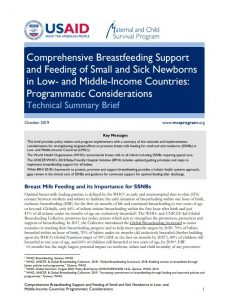
This brief provides policy makers and program implementers with a summary of the rationale and implementation considerations for strengthening targeted efforts to promote breast milk feeding for small and sick newborns (SSNBs) in Low-and Middle-Income Countries (LMICs). The World Health Organization (WHO) recommends breast milk to all infants including SSNBs requiring special care.
The UNICEF/WHO’s 2018 Baby-Friendly Hospital Initiative (BFHI) includes updated guiding principles and steps to implement breastfeeding support for all babies. While BFHI 2018’s framework to protect, promote and support breastfeeding provides a holistic health systems approach, gaps remain in the clinical care of SSNBs and guidance for continued support for optimal feeding after discharge.
Given the health burden and high mortality rates for SSNBs in LMICs, there is a need to intentionally integrate the care and feeding of SSNBs within nutrition, newborn and child health programming platforms, while also providing considerations for SSNB service delivery and supportive infrastructure within health system strengthening.
Depending on the country context, extensive changes may be required to ensure that SSNBs can access specialized care, for example, inpatient neonatal care may need to be decentralized and special care baby units established in district hospitals, which would require designated national and district level efforts and funding. Similarly, post-discharge follow-up is a crucial element of service delivery, but is often not clearly articulated or financed for SSNBs, leading to suboptimal implementation in LMICs. As a result, post-discharge care may need to be set up from scratch, requiring formal linkages to be established between facilities and any existing community health worker (CHW) programs.
Efforts to strengthen existing services, as described in BFHI 2018’s guidelines on “Country-level implementation and sustainability”, are described in this briefer according to each of the WHO HSS building blocks. For the purposes of this briefer, an additional community component has been added to reflect the importance of the community’s role in linking with health systems and supporting follow-up for vulnerable newborns.